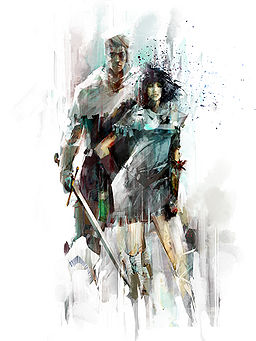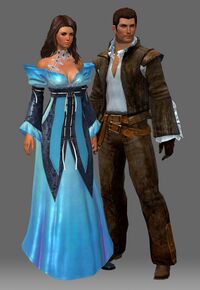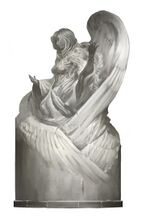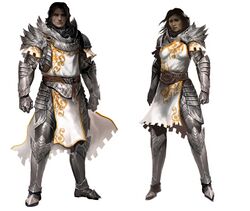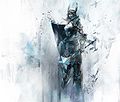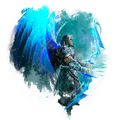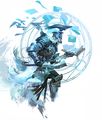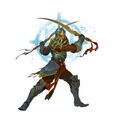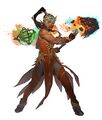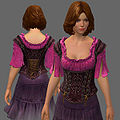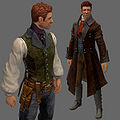Human
“Humans have lost their homeland, their security, and their former glory. Even their gods have withdrawn. And yet, the human spirit remains unshaken. These brave defenders of Kryta continue to fight with every ounce of their strength.
— In-game description
Once the dominant species of Tyria, the humans have not fared well in the last few years. Their kingdoms, once spanning the entire continent of Central Tyria, lie in ruins, leaving only Kryta, the oppressed Elona, and the isolationist Cantha. As the previous threats waned, an even deadlier one, that of the Elder Dragons, has threatened the very existence of the human race.
Humans are one of the five playable races in Guild Wars 2.
Character creation[edit]
During character creation, a player can customize a human's physical appearance and answer three race specific biography questions which affect their personal story:
- the social status the character was raised as.
- what one of their biggest regrets is.
- which of the Six Human Gods they are blessed by.
Selecting a human character will start players off in the tutorial Defending Shaemoor where players defend a Krytan village against the attacking centaurs. After finishing the mission, they will appear in Village of Shaemoor, the starting area in Queensdale.
The human home instance is in the Salma District of Divinity's Reach.
Human racial skills center on the human gods.
Nations and history[edit]
- This section covers events that occur after Guild Wars. For further information on the humans' history, see the Guild Wars Wiki's section on human history and storyline articles.
Although one of the most widespread and influential species in the world, humans are not native to the world of Tyria and were brought there by the Six Gods from elsewhere.[1][2][3] Not much is known of this world, except that humans "did not come with much magic of their own".[4] At the end of Guild Wars, humanity was still the dominant race in the world. Spanning three continents with an extensive trade network and significant population, humanity had spread to every corner of Tyria. From these heights humanity started to falter and for the past 250 years they have been in decline.
Currently, humans have three known main nations and at least two former. Although they share some similarities, each nation has different history, government, and culture.
Kryta[edit]
- Primary article: Kryta
The last human kingdom on Central Tyria, ruled by Queen Jennah, can be found in Kryta, troubled by bandits, centaurs and internal politics.
United under Queen Salma in 1088 AE, Kryta became the last stable, reasonable human nation and refugees fled to it from all of the troubled corners of the three continents. In 1219 AE, the great wave which accompanied the awakening Zhaitan smashed through Lion's Arch, the Krytan capital and the largest human settlement in Tyria at the time, and all of the coastal areas. It was completely destroyed and abandoned as the capital. When Lion's Arch was born again it was founded by pirates and it became a free city and was no longer under humanity's sole guidance. The new capital Divinity's Reach has become the bastion to human civilization and culture and is defended by the Seraph, Ministry Guard, and Shining Blade.
Elona[edit]
- Primary article: Elona
Elona, the Land of the Golden Sun, was originally a human kingdom under the rule of the Primeval Kings. It has since faced civil war and been divided among three provinces—Istan, Kourna, and Vabbi—before being united under the banner of the lich Palawa Joko, with a horrible famine sweeping through the land and Joko damming the Elon river - with the humans so weakened he was able to walk in with his undead armies. In approximately 1135 AE, he had completely taken control of Elona, turning it into the United Kingdom of Elona, where it was not uncommon for loyal humans to take up high-ranking positions in undead dominated factions, such as Archon Iberu in Mordant Crescent. Joko's reach in the Crystal Desert made, and continues to make, it near impossible to access Elona via land while Zhaitan makes it impossible to cross to it by sea. Since then, King Joko's leadership has turned Elona into a land of both living and undead, long without any contact to the other nations.
|
Following the demise of King Joko to the combined efforts of the Pact Commander and allies, including the dragon Aurene, a political void appeared in Elona as both living and undead factions vied for control, with Spearmarshal Zaeim of the newly reformed Order of the Sunspears trying to unite the various factions due to the impending threat of Kralkatorrik and his Branded, which threatened the whole land. After the Crystal Elder Dragon's demise, thanks to the combined efforts of factions from both Central Tyria and Elona, Zaeim expressed his plans to return to the Sunspears and to continue to rebuild their strength as well as find reliable people to lead Elona. |
Cantha[edit]
- Primary article: Cantha
The northern coastline of Cantha is the earliest known location of human settlements on the world of Tyria, being brought there by the Six Gods in 786 BE.[5] Ruled by the Empire of the Dragon, with their vassals Kurzicks and Luxons, Cantha was united in 1127 AE under the strong fist of Emperor Usoku who then embarked on a campaign to drive out non-human races from the continent. Under his tyranny Cantha became increasingly isolationist and contact with Tyria became increasingly rare. After the Rising of Orr, which was a massive tidal wave caused by Zhaitan's awakening, the emergence of Zhaitan's minions and the Dead Ships blocking sea trade routes between the continents, all information and contact was cut off.
|
Rising of Orr, called the Zhaitan Distater in Cantha, was also responsible for wiping out most of Old Kaineng and corrupted its inhabitants into Risen. However, after Zhaitan's death, thanks to the dragonjade technology, Cantha has become the most powerful nation in Tyria, with New Kaineng City, a thriving metropolis teeming with dragonjade technology, as the capital of the Empire of Cantha under the leadership of Empress Ihn. |
Ascalon[edit]
- Primary article: Ascalon
The Kingdom of Ascalon was a human sovereign state in Ascalon for hundreds of years until 1090 AE, when it was all but destroyed by the Foefire and reclaimed by the charr. After the Foefire, Ascalon became completely controlled by the charr, except for the human Stronghold of Ebonhawke, which stands against the charr to this day.
The kingdom was established in 100 BE, when its first king was crowned, with the humans driving the charr north, out of their briefly conquered lands. The humans' war with the charr continued for many years in Ascalon. On the back-foot since the searing, the humans repeatedly lost ground against the charr. From 1070 AE to 1090 AE, King Adelbern was able to maintain a tenuous grasp on Ascalon, until the charr marched on Ascalon City and in his madness, he unleashed the Foefire, turning much of the human population of Ascalon into ghosts.
Orr[edit]
- Primary article: Ruins of Orr
Ruins of Orr are the destroyed remains of one of the three Tyrian human kingdoms which was once a vibrant, proud, and prosperous nation and the home to the human gods. Since the awakening of the Elder Dragon Zhaitan caused the Rising of Orr from the depths of the Sea of Sorrows, the landscape has become twisted while the nation's former inhabitants have fallen into Zhaitan's corruption and become its Risen minions.
Culture[edit]
As a result of time and distance, humans, more so than other species in Tyria, have developed a variety of different cultures. As human refugees flood into Kryta from the crumbling edges of human civilization many stay together in an attempt to retain aspects of their history and culture which connect them to the homelands from which they fled. This is most evident in the capital city of Kryta, Divinity's Reach. There, many districts are named for and filled with the architecture and the peoples of non-Krytan origin, namely Ascalon, Cantha, and Elona.
Human society is filled with examples of great social inequality; the homeless struggle on the streets each day while the rich dine on fine food in opulent homes. But this doesn't mean people are stuck with the lives they have. Every human has the opportunity to take life and make something more of it - to make a difference to not only their life, but in the lives of those around them.
The other races view the humans as a traditional and conservative race, dying out and doomed to disappear from Tyria just as the dwarves did. But the humans struggle on, their spirit still strong, refusing to give up where others might walk away. In Ascalon, for example, the inhabitants of Ebonhawke, against all odds, still stare down the charr each day from that fortress' great walls. Despite being seen as the most conservative of the races, humans are willing to use new technologies and attempt to adapt and compete with the other races. Humans are tinkerers and craftsmen: a few inventors such as Uzolan the Artist help to expand the humans' technical knowledge. Of all the races, they retain the greatest expertise in history and agriculture, which may be attributed to humanity's patience and attention to detailed record-keeping.
All human cultures exhibit a preference for burial of the dead. However, with the recent—and apparently strengthening—rise of Zhaitan and undead minions, humans have begun to request posthumous cremation with increasing frequency to prevent their bodies from joining the hordes of the undead.
Religion[edit]
Most humans are very dedicated to the worship of the Six Human Gods: Balthazar, Dwayna, Grenth, Kormir, Lyssa, and Melandru. Each god is a patron of several broad areas of concern including war, healing, death, truth, beauty, and nature (respectively). These gods are credited with bringing the humans to the world of Tyria and have historically taken a large part in the development of the human race,[1] [2] often using their powers to guide the humans and intervene in historical events. Even after their departure from Tyria some 1300 years before the present day, the pantheon of human gods were very much involved with the affairs of humanity for a very long time. However, for the past 200 years or so, the Six Gods have stepped back. While they still answer the prayers of their followers, they are much more distant than before, letting humanity stand on its own feet.
This silence from their gods has not altered the strong faith of most humans (which is part of the reason for other species' perception of humans as conservative), though some now question an undying devotion to these now-absent gods. Temples are still made devoted to their worship, and the streets of Divinity's Reach are named and decorated for each of the gods. Some even choose to devote their lives to the worship of a particular god - a Priestess of Dwayna might find herself working in a hospital or a Priest of Balthazar arranging competitions for his god. Historically, several festivals were held devoted to one or more of the gods; of these, Wintersday is one of the most widely-celebrated.
Human culture is saturated with references to religion, with many common greetings invoking one or more (or all) of the six gods. While, to a certain extent, the prevalent belief systems of every species in Tyria have become somewhat ingrained into their respective cultures, the human relationship to the pantheon of the six is almost impossible to miss.
Government[edit]
Kryta[edit]
In Central Tyria, the last functioning human government is the monarchy of Kryta, with its current capital and seat of power at Divinity's Reach (prior to its flooding, Lion's Arch was the capital of Kryta). According to records, the Krytan system of government appears to resemble those of other (now extinct) human nations.
As the last standing human government in central Tyria, Kryta has effectively taken on the role of sole human government, though it still recognizes representatives of the other human nations (and by extension those nations' claims to jurisdiction over their respective peoples and territories) in its body of ministers (the Chamber of Ministers, commonly referred to as the Ministry). It is governed by a hereditary monarch and the Ministry. The Ministry functions as a legislature, composing laws and presenting them via proposals to the reigning monarch, who is currently Queen Jennah, a descendant of King Doric. The monarch functions as the executor of the will of the State, authorizing (or rejecting) the implementation of the laws proposed by the Ministry and taking responsibility for their enforcement. This division of power was originally intended to be a temporary arrangement as a concession to refugees from other human nations who were sheltered in Divinity's Reach, but in the 150 years since the flooding of Lion's Arch it has become a stable system and a cornerstone of Krytan culture.
The government is supported by its sanctioned armed forces: the Seraph, the Shining Blade, and the Ministry Guard. The Seraph function in Kryta as both a policing body and a national defense force, led by captains who command units and are assigned to provinces and territories throughout Kryta. The Shining Blade is a small but elite force commanded by the Master Exemplar (who answers only to the monarch) whose main purpose is to protect the reigning monarch of Kryta through arms, surveillance, and subterfuge. The Ministry Guard support and protect the interests of the members of the Ministry, and are commanded by the Legate Minister.
Kryta's government does have troubles, either because of or despite the current arrangement. Many in the noble class often disagree with the decisions of Queen Jennah; many of those same people also hold positions in the Ministry, which is itself filled with intrigues and plots orchestrated by ministers whose interests may not always align with the people (of late, many of these intrigues and plots are rumored to involve the current Legate Minister Caudecus Beetlestone, who is seen by some as a rival to the Queen). Even Kryta's sanctioned and unsanctioned armed forces are caught up in the power plays of the various members of the Krytan government, and this often plays out in disputes regarding who has jurisdiction in which series of events or circumstances.
Elona[edit]
Elona was originally ruled as a monarchy by the Primeval Kings, who ruled over the vast kingdom from the city of Fahranur. The first of the Primeval Kings is said to have been crowned by the Six Gods themselves, but it is unclear if that is true. While little is known about the way in which the Primeval Kings ruled their lands, and it is known that not all of the Primeval Dynasty was peaceful, it can be inferred that they were relatively sensible and just given that their colony of Kryta would become independent long before the Primeval Kings' fall.
Two bloody dynasties later, the united nation of Elona split into three distinct provinces (Istan, Kourna, and Vabbi), becoming a confederation. Not much is known about governmental practices during this period, as the era was largely defined by war against Palawa Joko and the conflict with the god Abbadon.
After initially failing to conquer the confederation of Elona, the lich Palawa Joko took power with his Awakened armies and formed the United Kingdom of Elona. Under Joko's rule, Elona is a brutal and tyrannical monarchy. Those that oppose him—including groups throughout the Crystal Desert beyond the Elonian provinces—are imprisoned, killed, or awakened. Joko maintains a strict and oppressive rule through military might. Loyalists who devote themselves to Joko, especially members of the higher classes (as is best demonstrated in the Domain of Istan with Palawadan) receive better treatment while the masses are often left to fend for themselves. Despite his brutality, Joko maintains a positive public image in many parts of his domain through propaganda, censorship, and the teaching of a fabricated version of world history that paints Joko as a hero, crediting him with the accomplishments of the Commander and various other heroes.
Cantha[edit]
Historically, Cantha's government was led by the Celestial Ministry, divided into four smaller Ministries, each one devoted to a different aspect of Cantha's imperial government.
Modern-day Cantha was built on a larger swath of Ministries, with each being devoted to a narrow scope of governance. The Ministry of Security, often shortened to MinSec and headed by Minister Li, enforced the law and justice. The Xunlai Jade Security force, led by Captain Fa and founded by Joon, was a corporate organization engaging in something of a bureaucratic turf war with MinSec.
In New Kaineng's underbelly and The Echovald Wilds, however, the Ministry-heavy hierarchy was muscled out by various groups and gangs that scrabbled for territory and control of their own, including the Jade Brotherhood, the Speakers, and the Kestrels.
Names[edit]
Human names and surnames vary from culture to culture, resulting in about seven different known naming styles. Most follow real-world cultures' names.
Ascalonian names typically resemble Western European and English naming style. Northern Canthans' names follow a mixture of Western and Asian naming practices with Asian names (with Korean names being prevalent in modern times, but names from other East Asian countries are not uncommon). As an example of differences between Canthan and Asian names, Canthan names don't always follow the typical Asian name order of family followed by personal names, but it's not uncommon for them to do so. Kurzick names follow a mixture of Germanic and Asian practices, while Luxons bear a mix of Greek and Asian names. Elonian names, on the other hand, often bear resemblance to African, South Asian and Middle-eastern names.
Historically, Krytan names have been similar to those of Southern Europe generally, with the addition of some Western European-style borrowings—though due to the merging of Elonian, Ascalonian and Canthan names, Krytan names have integrated those similarities as well. Finally, Orrians have Persian- and Mesopotamian-styled names. Various other styles of fantasy name are also seen among the various NPCs (particularly the surnames of old Ascalonian families).
- Examples
- Krytan names: Andrew, Anne, Bridgette, Jake, Kasmeer, Saul
- Elonian names: Aanisa, Amala, Iberu, Suhaila, Zaeim
- Canthan names: Ai, Chul-Moo, Hibari, Joon, Nguyen
- Kurzick names: Danika, Gael, Jan, Valeria
- Luxon names: Elora, Rota, Supak, Valrun
- Ascalonian names: Adelbern, Gwen, Kiki, Morgaine, Wade
- Orrian names: Farnaz, Nekandezzar, Vahid, Yasamin, Zoran
Types[edit]
- Primary article: Category:Humans
Gallery[edit]
- Screenshots
- Concept art
- Renders
See also[edit]
| The Guild Wars Wiki has an article on Human. |
- The Movement of the World
- The Line of Duty – The Three Military Orders of Kryta
- Gallery of human appearances
External links[edit]
- Official page, GuildWars2.com
- Human Clothing Art Direction, KristenPerryArt.com
- Human Week promotional blogs
- Character Art in Guild Wars 2 – Designing Humans, ArenaNet Blog (archived)
- Against the Wall: Humanity in Guild Wars 2, ArenaNet Blog (archived)
References[edit]
- ^ a b Orrian History Scrolls
- ^ a b Cathedral of Silence (story)
- ^ GuildMag issue #1 Q&A with Ree Soesbee, guildmag.com (Archived)
- ^ Comment by Angel McCoy: "Humans (including Canthan humans) were brought to Tyria (from…no spoilers!). They are not native to Tyria and did not come with much magic of their own.", Official forum
- ^ Guild Wars 2: Path of Fire—Road to the Desert
- ^ a b c d e f g Facing the Truth
- Gundayo: We are handmaidens of Kormir. My name is Gundayo, which means "honesty."
